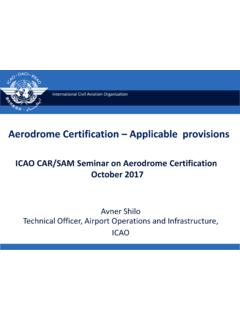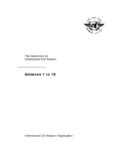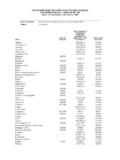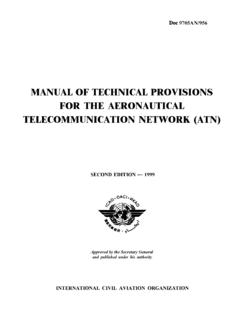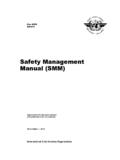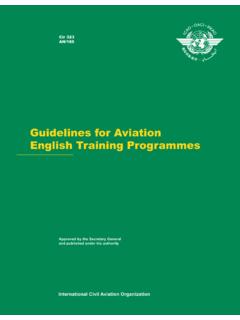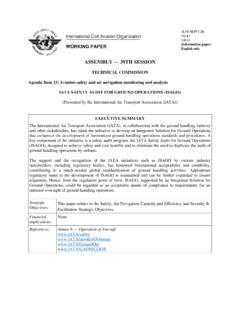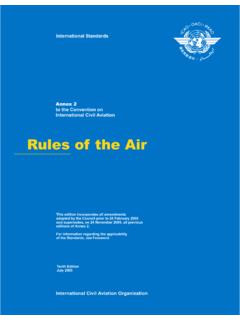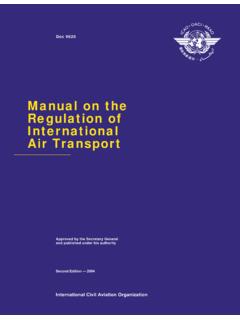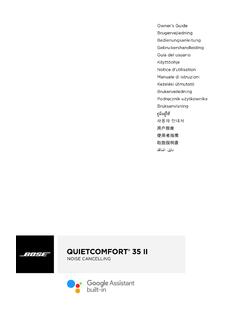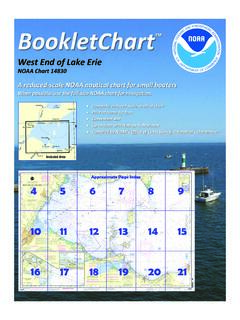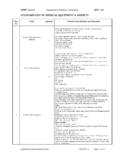Transcription of CONVENTION - ICAO
1 CONVENTION ON INTERNATIONAL CIVI L AVIATION DONE AT CHICAGO ON THE 7TH DAY OP DECEMBER 1944 I I CONVENTION ON INTERNATIONAL CIVIL AVIATION PREAMBLE WHEREAS the future development of int ernat ional civil aviatlori can greatly help to create and preserve friendship and understanding among the nztfona and peoples of the world, yet its abuse can become a threat to the general security; and WHEREAS it i~ desirable to avoid friction and to promote that cooperation between nations and peoples upon which the peace of the world depends; THEREFORE, the undersigned governments having agreed on certain principles and arrangements in order that international civil avia- tion may be developed in a safe and orderly manner and that interna- tional air transport services may be est-ablished on the basis of equality of opportunity and operated soun&ly and.
2 Economically ; Have accordingly concluded this CONVENTION to that end, PART &. NAVIGATION - CHAPTER I GENERAL PRINCIPLES AND APPLICATION OF THE CONVENTION Article - 1 Sovereignty The contracting States recognize that every Stete has comglete and exclusive sovereignty over the air- space above its territory. Article - 2 1 Iirritoq For the purposes of this CONVENTION the territory of a State shall be deemed to be the land areas and -. - 4 A I territorial waters adjacent thereto under the sover- II eignty, suzerainty, prot ection or mandate of such State Article 2 I Civil and (a) This CONVENTION shall be applicable only to state air- craft civil aircraft, and shall not be applicable to state aircraft . (b) Aircraft used in military, customs and police services shall be deemed to be state aircraft.
3 (c) No state aircraft of a contracting State shall fly over the territory of another State or land thereon without authorization by special agreement or otherwise, and in accordance with the terns thereof. (d) The contracting States undertake, when lssu- ing regulations for their state aircraft, that they will have due regard for the safety of navigation of civil aircraft . Article 4 Misuse of Each contracting State agrees not to use civil civil I aviation for any purpose inconsistent with the aims of 1 this CONVENTION . CHAPTER I1 FLIGHT OVER TERRITORY CONTRACTING Article 2 -- STATES Right of non- Each contracting State agrees that all aircraft scheduled flight of the other contracting States, being aircraft not engaged in scheduled international air services shall have the right, subject to the observance of the terms of this CONVENTION , to make flights into or in transit non-stop across its territory and to make stops for - -- 4 non-traffic purposes without the necessity of obtain- ing prior permission, and subject to the right of the State flown over to require landing.
4 Each c3ntracting State nevertheless reserves the right, for reasons of safety of flight, to require aircraft desiring to pro- ceed over regions which are inaccessible or without adequate air navtgation facilities to follow prescribec routes, or to obtain special permlesion for such flights. Such aircraft, if engaged in the carriage of pas- sengers, cargo, or mail for remuneration or hire on other than scheduled international air services, shall also, subject to the provisions of Article 7, have the privilege of taking on or discharging passengers, cargo, or mail, subJect to the right of any State where such embarkation or discharge t&es place to impose such regulations, conditions or limitations as it may consider desirable. Article Scheduled No scheduled international air service may be air services operated over or into the territory of a contracting State, except with the special permission or other authorization of that State, and in accordance with the terms of such permission or authorization.
5 Article Z Cabotage Each contracting State shall have the right to refuse permission to the aircraft of other contract- ing States to take on in its territory passengers, mail and cargo carried for remuneration or hire and deetined for another point within its territory. Eaoh contracting State undertakes not to enter into any ar- rangement s which specifically grant any such privilege on an exclusive basis to my other State or an airline of any other State, and not to obtain any euch exclu- sive privilege from any other State. Article 8 - Pilotless No aircraft capable of being flown without a pilot aircraft shall be flown without a pilot over the territory of a contracting State without special authorization by that State and in accordance with the terms of euch authorization. Each contracting State undertake8 to insure that the flight of such aircraft without a pilot in regions open to civil aircraft shall be so controlled as to obviate danger to civil aircraft, Article - 9 Prohibited (a) Each contracting State may, for reasons of areas military necessity or public safety, restrict or pro- hibit uniformly the aircraft of other States from fly- ing over certain areas of its territory, provided th%'b no distinction in this respect is made between the aircraft of the State whose territory is involved, engaged in international scheduled airline services, and the aircraft of the other contracting States like- wise engaged.
6 Such prohibited areas ehall be of I reasonable extent and location so as not to interfere unnecessarily with air navigation. Descriptions of ~ such prohibited areas in the territory of a contract- I ing State, as well ae any subsequent alterations r - - therein, shall be communicated as soon as possible to the other contracting States and to the International Civil Aviation Organization. (b) Each contracting State reserves also the right, in exceptional circumstances or during a period of emergency, or in the interest of public sdety, and with immediate effect, temporarily to restrict or pro- hibit flying over the whole or any part of it6 terri- tory, on condition that such restriction or prohibition ehall be applicable without distinction of nationality to aircraft of all other States. (c) Each contracting State, under such regula- tions a8 it may preecribe, may require any aircraft entering the areas contemplated in subparagraphs (a) or (b) above to effect a landing as soon as practi- cable thereafter at some designated airport within its territory.
7 Article 10 Landing at Except in a case where, under the terms of this cuetoms airport CONVENTION or a special authorization, aircraft are permitted to cross the territory of a contracting State without landing, every aircraft which enters the ter- ritory of a contracting State shall, if the regulations of that State so require, land at an airport designated by that State for the purpose of customs and other examination. On departure from the territory of a contracting State, such aircraft ehall depart from a similarly designated customs airport. Particulars of all designated customs airports shall be published f by the State and transmitted to the International Civil Aviation Organization established under Part I1 of this CONVENTION for communication to all other con- tracting States. Article 11 Applicability Subject to the provisione of this CONVENTION , the of air regu- laws and regulations of a contracting State relating to the admission to or departure from its territory of aircraft engaged in int ernational air navigation, or to the operation and navigation of such aircraft while within its territory, shall be applied to the aircraft of all contracting States without distinction as to nationality, and shall be complied with by such air- craft u2on entering or departing from or while within the territory of that State.
8 Article 12 Rules of the Each contracting State undertakes to adopt meas- ures to insure that every aircraft flying over or maneuvering within its territory and that every air- craft carrying its nationality mark, wherever such air- craft may be, shall comply with the rules and regula- tions relating to the flight and maneuver of aircraft there in force. Each contracting State undertakes to keep its own regulations in these respects uniform, to the greatest poesible extent, with thoee established from time to time under this CONVENTION . Over the high seas, the rules in force shall be those estab- lished under this CONVENTION . Each contracting State - undertakes to insure theproaecution of all persons violating the regulations applicable. Article 13 Entry and The laws and regulations of a contracting State clearance regulations asto theadmissiontoordeparturefromiteterri- tory of passengers, crew or cargo of aircraft, such as regulations relating to entry, clearance, immigra- tion, passports, customs, and quarantine shall be 1 complied with by or on behalf of such passengers, crew or cargo upon into or departure from, or while within the territory of that State.
9 Article 14 -- - Prevention of Each contracting State agrees to take effective spread of disease measures to prevent the spread by meons of air naviga- tion of cholera, typhus (epidemic), smallpox, yellow fever, plague, and such other communicable diseases as the contracting States shall from time to time decide to designate, and to that end contracting States will keep in close consultation with the agen- cies concerned with international regulations relat- ing to sanitary measures applicable to aircraft. Such consultation shall be without prejudice to the application of any existing international oonvent ion on this subject to which the contracting States may be parties. Article 15 Airport and Every airport in a contracting St&:te which is similar charges open to public use by its national aircraft shall likewise, subject to the provisions of Article 68, 1 L be open under uniform conditions to the aircraft of all the other contracting States.
10 The like uniform conditions shall apply to the use, by aircraft of every contracting State, of all air navigation facil- it ies, including radio and meteorological services, which may be provided for public use for the safety end expedition of air navigation. Any charges that may be imposed or permitted to be imposed by a contracting State for the use of such airports and air navigation facilities by the aircraft of any other contracting State shall not be higher, (a) As to aircraft not engaged in sched- uled international air services, than those that would be paid by its national aircraft of the same engaged in similar operations, and (b) As to aircraft engaged in scheduled international air eervicee, than those that would be paid by its national aircraft engaged in aim- ilar international air services.
